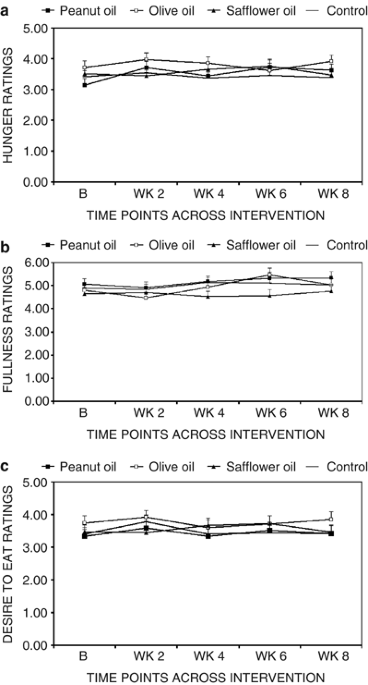
- Select a language for the TTS:
- UK English Female
- UK English Male
- US English Female
- US English Male
- Australian Female
- Australian Male
- Language selected: (auto detect) - EN
Play all audios:
ABSTRACT OBJECTIVE: Peanut consumption may improve lipid profiles without promoting weight gain. Both properties have been attributed to their high-unsaturated fat content. Mono and
polyunsaturated fatty acids reportedly hold stronger satiety value than saturated fats and may help appetite control. This study investigated the effects of chronic peanut oil consumption on
appetite and food choice. RESEARCH METHODS AND PROCEDURES: A total of 129 healthy adults from three countries (Brazil, Ghana and US) were randomly assigned to one of four treatment arms:
consumption of peanut oil, olive oil or safflower oil as 30% of individual resting energy expenditure (REE) for 8 weeks or no dietary intervention. Participants received no other dietary
guidance. They completed appetite questionnaires eliciting information about hunger, fullness, desire to eat, and prospective consumption during all waking hours for 1 day at weeks 2 and 6
and for 1 or 3 days at weeks 0, 4 and 8. Diet records were completed at weeks 0, 4 and 8. RESULTS: No differences in appetitive ratings were observed over the 8-week trial. There were no
significant treatment by time interactions. Total caloric intake was significantly higher at week 8 relative to baseline (_F_=10.08, _P_<0.05). The increases for each treatment were:
peanut oil=197±114; olive oil=237±121; safflower oil=274±90; control=75±71. Free-feeding intake, an index of dietary compensation, was reduced significantly at weeks 4 and 8 compared to
baseline (_F_=9.08, _P_<0.00). The declines (compensation scores) were (kcals): peanut oil=−208±105 (46%); olive oil=−235±105 (50%); safflower oil=−186±102 (44%). There were no
significant differences across countries in appetite ratings. DISCUSSION: A prior intervention with whole peanuts reported a dietary compensation score of 66% over 8 weeks, this compares to
a 46% compensation score observed with peanut oil. Our data suggests that the lipid fraction in peanuts elicits a weak effect on satiety. Access through your institution Buy or subscribe
This is a preview of subscription content, access via your institution ACCESS OPTIONS Access through your institution Subscribe to this journal Receive 12 print issues and online access
$259.00 per year only $21.58 per issue Learn more Buy this article * Purchase on SpringerLink * Instant access to full article PDF Buy now Prices may be subject to local taxes which are
calculated during checkout ADDITIONAL ACCESS OPTIONS: * Log in * Learn about institutional subscriptions * Read our FAQs * Contact customer support SIMILAR CONTENT BEING VIEWED BY OTHERS
SHORT-TERM EFFECTS OF HIGH-PROTEIN, LOWER-CARBOHYDRATE ULTRA-PROCESSED FOODS ON HUMAN ENERGY BALANCE Article Open access 13 March 2025 EFFECTS OF WHEY PROTEIN AND DIETARY FIBER INTAKE ON
INSULIN SENSITIVITY, BODY COMPOSITION, ENERGY EXPENDITURE, BLOOD PRESSURE, AND APPETITE IN SUBJECTS WITH ABDOMINAL OBESITY Article 18 September 2020 ONE-YEAR CHANGES IN FRUIT AND VEGETABLE
VARIETY INTAKE AND CARDIOMETABOLIC RISK FACTORS CHANGES IN A MIDDLE-AGED MEDITERRANEAN POPULATION AT HIGH CARDIOVASCULAR RISK Article 11 April 2022 REFERENCES * Fraser GE, Sabate J, Beeson
WL, Strahan TM . A possible protective effect of nut consumption on risk of coronary heart disease. The Adventist Health Study. _Arch Intern Med_ 1992; 152: 1416–1424. Article CAS Google
Scholar * Hu FB, Stampfer MJ, Manson JE, Rimm EB, Colditz GA, Rosner BA _et al_. Frequent nut consumption and risk of coronary heart disease in women: prospective cohort study. _BMJ_ 1998;
317: 1341–1345. Article CAS Google Scholar * Ellsworth JL, Kushi LH, Folsom AR . Frequent nut intake and risk of death from coronary heart disease and all causes in postmenopausal women:
the Iowa Women's Health Study. _Nutr Metab Cardiovasc Dis_ 2001; 11: 372–377. CAS PubMed Google Scholar * Albert CM, Gaziano JM, Willett WC, Manson JE . Nut consumption and decreased
risk of sudden cardiac death in the Physicians Health Study. _Arch Intern Med_ 2002; 162: 1382–1387. Article Google Scholar * O'Byrne DJ, Knauft AD, Shireman R . Low
fat-monounsaturated rich diets containing High-Oleic Peanuts improve serum lipoprotein profiles. _Lipids_ 1997; 32: 687–695. Article CAS Google Scholar * Rajaraman S, Burke K, Connell B,
Myint T, Sabate J . A monounsaturated fatty acid–rich pecan enriched diet favorably alters the serum lipid profile of healthy men and women. _J Nutr_ 2001; 131: 2275–2279. Article Google
Scholar * Fraser GE, Bennett HW, Jaceldo KB, Sabate J . Effect on body weight of a free 76 Kilojoule (320 calorie) daily supplement of almonds for six months. _J Am Coll Nutr_ 2002; 21:
275–283. Article Google Scholar * Alper CM, Mattes RD . Effects of chronic peanut consumption on energy balance and hedonics. _Int J Obes Relat Metab Disord_ 2002; 26: 1129–1137. Article
CAS Google Scholar * Alper CM, Mattes RD . Peanut consumption improves indices of cardiovascular disease risk in healthy adults. _J Am Coll Nutr_ 2003; 22: 133–141. Article Google Scholar
* USDA. Center for nutrition policy and promotion. The role of nuts in a healthy diet. _Insight_ 2000; 23: 1–2. * McManus K, Antinoro L, Sacks F . A randomized controlled trial of a
moderate-fat, low-energy diet compared with a low fat, low-energy diet for weight loss in overweight adults. _Int J Obes Relat Metab Disord_ 2001; 25: 1503–1511. Article CAS Google Scholar
* Piers LS, Walker KZ, Stoney RM, Soares MJ, O'Dea K . The influence of the type of dietary fat on postprandial fat oxidation rates: monounsaturated (olive oil) vs saturated fat
(cream). _Int J Obes Relat Metab Disord_ 2002; 26: 814–821. Article CAS Google Scholar * Jones JH, Schoeller DA . Polyunsaturated: saturated ratio of diet fat influences energy substrate
utilization in the human. _Metabolism_ 1988; 37: 145–151. Article CAS Google Scholar * Weir JB . New methods for calculating metabolic rate with special reference to protein metabolism.
_J Physiol Lond_ 1949; 109: 1–9. Article Google Scholar * DiMeglio DP, Mattes RD . Liquid versus solid carbohydrate: effects on food intake and body weight. _Int J Obes Relat Metab Disord_
2000; 24: 794–800. Article CAS Google Scholar * Rolls BJ . Carbohydrates, fats and satiety. _Am J Clin Nutr_ 1995; 61: 960S–967S. Article CAS Google Scholar * Stubbs RJ, van Wyk MC,
Johnstone AM, Harbron CG . Breakfasts high in protein, fat or carbohydrate: effect on within-day appetite and energy balance. _Eur J Clin Nutr_ 1996; 50: 409–417. CAS Google Scholar *
Stubbs RJ . Peripheral Signals affecting food intake. _Nutr_ 1999; 15: 614–625. Article CAS Google Scholar * Friedman MI, Tordoff MG, Ramirez I . Integrated metabolic control of food
intake. _Brain Res Bull_ 1986; 17: 855–859. Article CAS Google Scholar * French S, Mutuma S, Francis J, Read N, Meijer G . The effect of fatty acid composition on intestinal satiety in
man. _Int J Obes_ 1998; 22: 82S. Google Scholar * Lawton CL, Delargy H J, Brockman J, Smith FC, Blundell JE . The degree of saturation of fatty acids influences post-ingestive satiety. _Br
J Nutr_ 2000; 83: 473–482. CAS PubMed Google Scholar * Alfenas RC, Mattes RD . Effect of fat sources on satiety. _Obes Res_ 2003; 11: 183–187. Article Google Scholar * Kamphuis MM,
Westerterp-Plantenga MS, Saris WH . Fat specific satiety in humans for fat high in linoleic acid vs fat high in oleic acid. _Eur J Clin Nutr_ 2001; 55: 499–508. Article CAS Google Scholar
* Robinson SM, Jaccard C, Persaud C, Jackson AA, Jequier E, Schutz Y . Protein turnover and thermogenesis in response to high protein and high carbohydrate feeding in men. _Am J Clin Nutr_
1990; 52: 72–80. Article CAS Google Scholar * Burton-Freeman B . Dietary fiber and energy regulation. _J Nutr_ 2000; 130: 272S–275S. Article CAS Google Scholar * Astrup A, Toburo S,
Christensen NJ, Quaade F . Pharmacology of thermogenic drugs. _Am J Clin Nutr_ 1992; 55: 246S–248S. Article CAS Google Scholar * Blundell JE, Macdiarmid JI . Passive Over consumption, Fat
intake and short-term energy balance. _Ann of NY Acad Sci_ 1997; 827: 392–405. Article CAS Google Scholar * Mattes RD . Fat taste and lipid metabolism in humans. _Physiol & Behav_
(in press). * Gilbertson TA, Liu L, York DA, Bray GA . Dietary fat preferences are inversely correlated with peripheral gustatory fatty acid sensitivity. _Ann NY Acad Sci_ 1998; 30: 165–168.
Article Google Scholar * Kamphuis MMJW, Saris WHM, Westerterp-Plantenga MS . The effect of addition of linoleic acid on food intake regulation in linoleic acid tasters and linoleic acid
non-tasters. _Br J Nutr_ 2003; 90: 199–206. Article CAS Google Scholar * Beardshall K, Frost G, Morarji Y, Domin J, Bloom SR, Calam J . Saturation of fat and cholecystokinin release:
implications for pancreatic carcinogenesis. _Lancet_ 1989; 2: 1008–1010. Article CAS Google Scholar * Sacks FM, Appel LJ, Moore TJ, Obarzanek E, Vollmer WM, Svetkey LP _et al_. A dietary
approach to prevent hypertension: a review of the Dietary Approaches to Stop Hypertension (DASH) Study. _Clin Cardiol_ 1999; 22: III6–III10. Article CAS Google Scholar * Kris-Etherton PM,
Yu-Poth S, Sabate J, Ratcliffe HE, Zhao G, Etherton TD . Nuts and their bioactive constituents: effects on serum lipids and other factors that affect disease risk. _Am J Clin Nutr_ 1999;
70: 504S–511S. Article CAS Google Scholar Download references AUTHOR INFORMATION AUTHORS AND AFFILIATIONS * Department of Foods and Nutrition, Purdue University, West Lafayette, IN, USA S
S Iyer & R D Mattes * Food Research Institute, M.20, Accra, Ghana L A Boateng & P Lokko * Federal University of Viçosa, MG, Brazil R L Sales, S B Coelho, J B R Monteiro & N M B
Costa Authors * S S Iyer View author publications You can also search for this author inPubMed Google Scholar * L A Boateng View author publications You can also search for this author
inPubMed Google Scholar * R L Sales View author publications You can also search for this author inPubMed Google Scholar * S B Coelho View author publications You can also search for this
author inPubMed Google Scholar * P Lokko View author publications You can also search for this author inPubMed Google Scholar * J B R Monteiro View author publications You can also search
for this author inPubMed Google Scholar * N M B Costa View author publications You can also search for this author inPubMed Google Scholar * R D Mattes View author publications You can also
search for this author inPubMed Google Scholar CORRESPONDING AUTHOR Correspondence to R D Mattes. RIGHTS AND PERMISSIONS Reprints and permissions ABOUT THIS ARTICLE CITE THIS ARTICLE Iyer,
S., Boateng, L., Sales, R. _et al._ Effects of peanut oil consumption on appetite and food choice. _Int J Obes_ 30, 704–710 (2006). https://doi.org/10.1038/sj.ijo.0803180 Download citation *
Received: 27 May 2005 * Revised: 29 August 2005 * Accepted: 10 September 2005 * Published: 29 November 2005 * Issue Date: 01 April 2006 * DOI: https://doi.org/10.1038/sj.ijo.0803180 SHARE
THIS ARTICLE Anyone you share the following link with will be able to read this content: Get shareable link Sorry, a shareable link is not currently available for this article. Copy to
clipboard Provided by the Springer Nature SharedIt content-sharing initiative KEYWORDS * satiety * appetite * energy intake * peanut oil * free-feeding intake * dietary compensation







